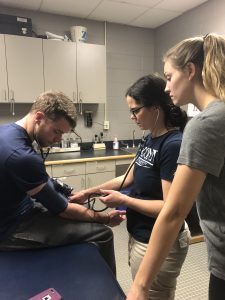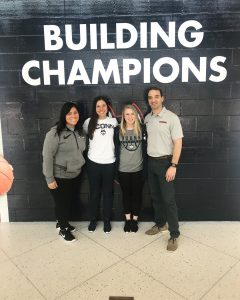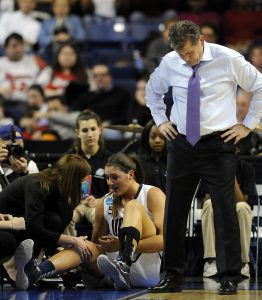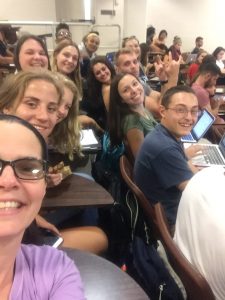
About the Athletic Training Program

The University of Connecticut Athletic Training Program has a long standing history and began offering a Professional Master of Science degree in Athletic Training (MSAT), in May 2019. The Professional MSAT program provides students with the opportunity to develop the knowledge and skills necessary to be a certified athletic trainer. The full-time, two-year program provides students with a didactic and clinical curriculum that addresses the professional education standards as established by the Commission on Accreditation of Athletic Training Education (CAATE). Students are prepared to become evidence-based health care professionals through a combination of classroom, clinical education, and research experiences.
The program at the University of Connecticut is unrivaled in its ability to expose students to diversified clinical education experiences with a focus in intercollegiate athletics, non-traditional settings, three clinical immersive experiences and provides students the opportunity to learn from experts in the fields of qualitative research, sport safety, and many others. Students gain first hand experience and work closely with program faculty, not only in the classroom and clinical settings but also in our research labs in the Korey Stringer Institute's (KSI) mission heat lab, and in musculoskeletal injury prevention and rehabilitation via the Sport Optimization and Rehabilitation (SOAR) lab. The UConn Athletic Training and Physical Therapy Programs are collaboratively aligned within the Department of Kinesiology, affording students the unique aspect of interdisciplinary heath care education. Students work together with other health care disciplines starting in their first semester.
Excellence in Research
The Professional Athletic Training Program (ATP) at the University of Connecticut (UConn) is unrivaled in its ability to expose students to diversified clinical education experiences with a focus in intercollegiate athletics, non-traditional settings, youth sports and many others. Coupled with world leading experts in the fields of qualitative research, sport safety and biomechanics students gain first hand experiences along side researchers at the Korey Stringer Institute (KSI), and the Sport Optimization and Rehabilitation (SOAR) lab, students will gain a comprehensive educational experience, allowing them to immediately contribute to the delivery of quality patient-centered care.
Vission and Mission Statement
The vision of the Athletic Training Program at the University of Connecticut is to provide the student a dynamic and engaging learning environment that supports the growth and professional development necessary to excel within the field of athletic training and be active members of the healthcare community.
The mission of the Athletic Training Program at the University of Connecticut is to provide our students with a high-quality education that incorporates inter-professional learning opportunities, exposure to evidence-based practice and high-quality research, and diverse educational experiences. We will inspire our students to be advocates for the profession and to be life-long learners committed to the delivery of high quality patient-centered healthcare.






Program Goals & Objectives
Prepare athletic training students for success in a variety of athletic training opportunities by:
- Providing clinical education experiences which allows for a diverse clinical background with Preceptors who demonstrate a commitment to teaching and learning while serving as role models for professional development. Students will be engaged in traditional athletic training settings, non-traditional and/or emerging settings that will prepare them for their future careers.
- Mid-semester and Final Clinical Education Preceptor & Clinical site evaluations completed by the students will demonstrate high quality of instruction and support in learning, as well as show continuity in clinical setting contributing to student’s long-term professional goals.
- Site evaluations (at least 1 per semester when clinical rotation is being used) to ensure positive clinical experiences and identify complications and prioritize early intervention. Exit interviews, at the completion of the program, will demonstrate satisfaction with clinical education and Preceptor interactions.
- Consistently providing challenging course work, research, and mentoring opportunities.
- Course evaluations will demonstrate that students are satisfied with the delivery of content in their courses.
- Exit interviews will highlight overall satisfaction with coursework and experiences related to research and mentoring.
- Exposing the athletic training student to Interprofessional practice and other professionals of the athletic health care team both in the classroom and clinical settings.
- Mid-semester and Final Evaluations of each Clinical Site will allow the students to provide feedback, and the program to gain insight, into the exposure to inter-professional healthcare opportunities.
- Exit interviews will demonstrate satisfaction with opportunities to develop their knowledge and interact with other members of the healthcare team.
Students will demonstrate entry-level knowledge and skills in the prevention; immediate management; examination and evaluation; rehabilitation & reconditioning; health care administration; professional development & responsibilities
- Students will pass didactic and clinical coursework with a passing grade according to the Graduate School catalog and the policies and procedures set forth by the athletic training program
- Students will self-reflect about their own abilities and progress through completing goals for each clinical education experience.
- Exit interviews will demonstrate satisfaction with overall experiences related to professional development and opportunities to develop as a practitioner, as well as self-perceived competency on each area of skill development.
- Preceptors will monitor and record students’ progressive competency with each area of athletic training practice through assessing the clinical integration proficiencies during each clinical education experience and through the mid- and final evaluations of the student
- Students will successfully pass the athletic training education program cumulative examination
- Students will demonstrate competency on each area of the cumulative exam prior to completing their final clinical immersion experience
- Students will successfully challenge the BOC exam.
- Board of certification examination results will demonstrate a first time and overall pass rate that reflect a strong comparison to the national examination scores.
The AT Program places students in supervised situations, which encourage professional and ethical behavior, common sense, evidence-based practice, rational thinking, and problem-solving skills.
- The AT program retains the clinical site on the basis of the feedback from both the student and the site preceptor regarding the professional and ethical behavior, learning experiences, and opportunities to learn
- Exit interviews will demonstrate students who report satisfaction with clinical education experiences and report high scores for the program.
- Site Visit evaluations will report effective clinical education experiences that are supportive, challenging, and allow for professional growth.
- Student evaluations of the site and Preceptor will demonstrate satisfactory scores regarding supervision, interaction, and opportunities for learning
- Student site quality checklists within clinical classes will provide timely reporting of hands on clinical experiences/skills, opportunities for learning real-time, barriers to learning,
- At the conclusion of the performance evaluation in ATrack there is a separate oral one-on-one Site Performance Summary/Review with the clinical coordinator(s) to allow students to provide constructive feedback and for quality assurance that the student and site are both getting what they needed.
Graduate Study Options for Certified Athletic Trainers
While the Athletic Training program does not offer a post-professional graduate degree in Athletic Training, our Exercise Science program provides graduate opportunities for Certified Athletic Trainers. As part of these programs, students may be exposed to a combination of coursework, teaching experience, research experience, and clinical experience.
Both programs prepare students for careers in athletic training at all levels – including research, academia, and beyond. Many of our alumni hold positions as directors of athletic training programs or head and assistant athletic trainers at the secondary and collegiate level. Exposure to a variety of ongoing quantitative and qualitative field and laboratory studies provides preparation for the final thesis research project.
Advisors may include Dr. Casa, Dr. Singe, Dr. Glaviano, and Dr. DiStefano among others within the department. Courses may include Biomechanics, Neuromuscular Control, Thermophysiology, Exertional Heat Stroke, courses related to Sports Medicine, practical experience, and courses in physiology or statistics. Certified Athletic Trainers expand their clinical experience at the high school, secondary school, or division 1A university level. Full In-State and Out-of-State tuition waived for all Graduate Assistants and assistantships are provided at varying levels.
Additional options available in Exercise Science.